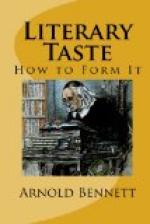And a disturbance of spirit is one of the finest pleasures
that a highly-organised man can enjoy. But this
truth can only be really learnt by the repetitions
of experience. As an aid to the more exhaustive
examination of your feelings under Wordsworth, in order
that you may better understand what he was trying to
effect in you, and the means which he employed, I
must direct you to Wordsworth himself. Wordsworth,
in addition to being a poet, was unsurpassed as a
critic of poetry. What Hazlitt does for poetry
in the way of creating enthusiasm Wordsworth does
in the way of philosophic explanation. And Wordsworth’s
explanations of the theory and practice of poetry are
written for the plain man. They pass the comprehension
of nobody, and their direct, unassuming, and calm
simplicity is extremely persuasive. Wordsworth’s
chief essays in throwing light on himself are the
“Advertisement,” “Preface,”
and “Appendix” to
Lyrical Ballads;
the letters to Lady Beaumont and “the Friend”
and the “Preface” to the Poems dated 1815.
All this matter is strangely interesting and of immense
educational value. It is the first-class expert
talking at ease about his subject. The essays
relating to
Lyrical Ballads will be the most
useful for you. You will discover these precious
documents in a volume entitled
Wordsworth’s
Literary Criticism (published by Henry Frowde,
2s. 6d.), edited by that distinguished Wordsworthian
Mr. Nowell C. Smith. It is essential that the
student of poetry should become possessed, honestly
or dishonestly, either of this volume or of the matter
which it contains. There is, by the way, a volume
of Wordsworth’s prose in the Scott Library (1s.).
Those who have not read Wordsworth on poetry can have
no idea of the naive charm and the helpful radiance
of his expounding. I feel that I cannot too strongly
press Wordsworth’s criticism upon you.
Between Wordsworth and Hazlitt you will learn all
that it behoves you to know of the nature, the aims,
and the results of poetry. It is no part of my
scheme to dot the “i’s” and cross
the “t’s” of Wordsworth and Hazlitt.
I best fulfil my purpose in urgently referring you
to them. I have only a single point of my own
to make—a psychological detail. One
of the main obstacles to the cultivation of poetry
in the average sensible man is an absurdly inflated
notion of the ridiculous. At the bottom of that
man’s mind is the idea that poetry is “silly.”
He also finds it exaggerated and artificial; but these
two accusations against poetry can be satisfactorily
answered. The charge of silliness, of being ridiculous,
however, cannot be refuted by argument. There
is no logical answer to a guffaw. This sense of
the ridiculous is merely a bad, infantile habit, in
itself grotesquely ridiculous. You may see it
particularly in the theatre. Not the greatest
dramatist, not the greatest composer, not the greatest
actor can prevent an audience from laughing uproariously
at a tragic moment if a cat walks across the stage.




